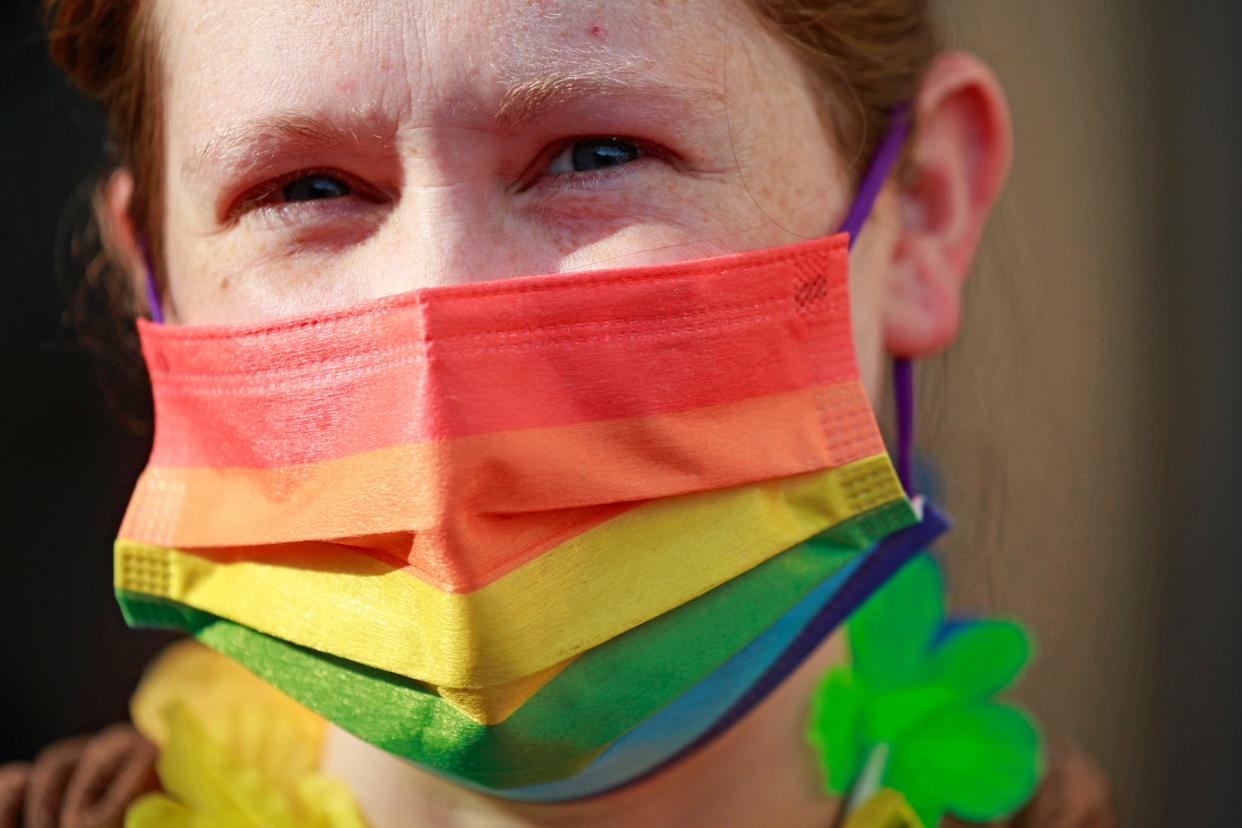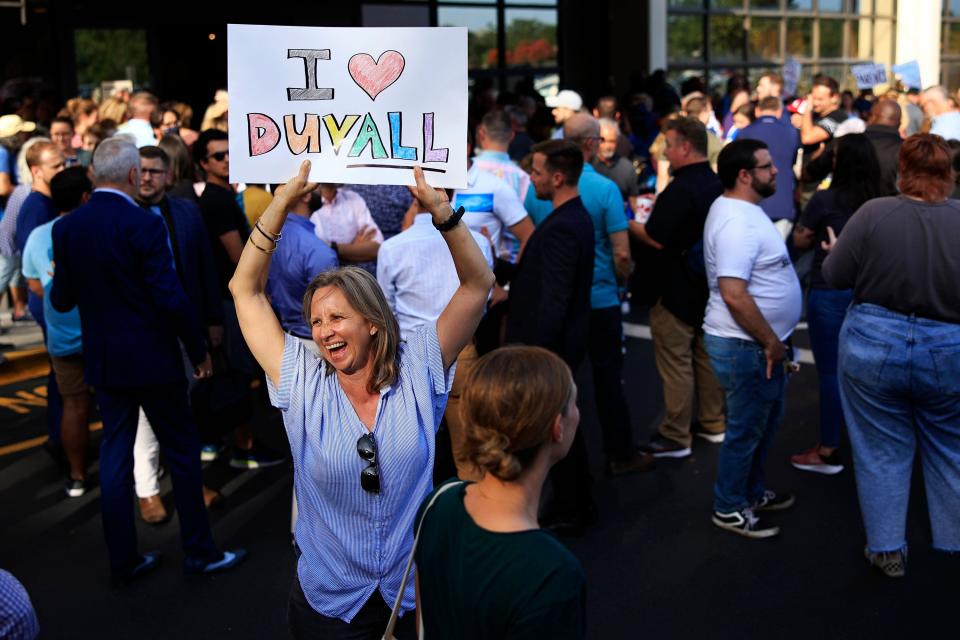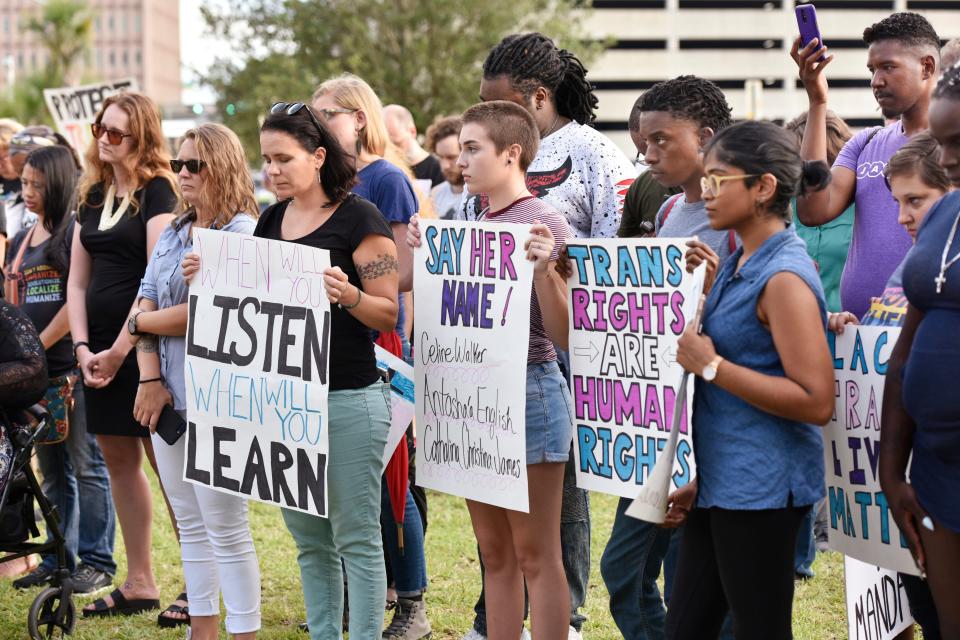Critics fear new Duval Schools LGBTQ+ guide strips student protections

It may be Pride month, but LGBTQ+ advocates say that at a time when visibility and acceptance should be highlighted, they fear queer youth may instead be facing scrutiny and erasure.
In Duval Schools, an LGBTQ+ Guide that was once praised by other counties as among the golden standard could now be stripped to comply with state direction that follows the Parental Rights in Education Law, known by critics as "Don't Say Gay." That issue, coupled with other statewide actions that affect the LGBTQ+ community, have advocates worried about their safety.
Across Florida in recent years, school districts published annual LGBTQ+ Guides that provided school faculty and staff with advice on how to ensure campus was a safe space for students who are part of the LGBTQ+ community.
From recommendations on dealing with pronoun usage to securing a gender-neutral locker room or bathroom for transitioning and transgender students, Duval Schools' previous LGBTQ+ Guide was 37 pages long.
It was praised by Chris Sands of PFLAG Tallahassee at a recent Leon County School Board meeting where he said the district's version should be more like Duval County's.
Now, Duval Schools' new draft guide is eight pages — even smaller than Leon County's 19-page document — cutting roughly 78 percent of the content it once had if you judge by page count.
A Times-Union review of the guide shows the incoming draft version has stripped away pages worth of explanations and guidance that discuss specific scenarios a teacher could encounter with an LGBTQ+ student.
"By Duval County Public Schools editing this guide down to the very nubs, our students are losing access to the very environment they deserve," said community member Leah Kennelly at a school board meeting. She said the new guide, if approved, could push students to the fringes and "creates an unsafe learning environment."
Background: Duval School Board member's resolution urges support for so-called 'Don't Say Gay' law
Aftermath: Duval School Board tables Joyce's Parental Rights resolution after hundreds show up at meeting
'History is LGBTQ+ history': Jacksonville students speak out against 'Don't Say Gay' bill
More: 'Don't Say Gay' bill raises concerns among Florida LGBTQ community and allies
The old guide included shutting down instances where a student might use a homophobic remark toward another student, or how to respond when a student comes out to an adult on campus or to other students. The new draft version removes most, if not all, of those longer comprehensive suggestions, instead acting more like an abridged glossary of LGBTQ+ terms. Educators fear they may be obligated to report any time a student comes out on campus to the student's family, with or without their consent.
Gone are the explicitly stated paragraphs about transgender students' privacy when it comes to bathrooms, locker rooms, overnight field trips, dress code policy and even what name a student would like to go by in class. Instead, there are blanket statements that put the onus on each school's administration on a "case-by-case basis."
Oliver, a 16-year-old transgender Duval Schools student whose full name we are not publishing to protect his privacy, said he wants to see more LGBTQ+ support guidance in schools — not less.
"I've walked in halls when someone yells to me 'transformers' or 'autobots, roll out' because I'm trans and nothing was done about it," he told the Times-Union. "As a trans kid, I don't like having to go to the office for a key to go use the restroom. I feel like what or who we are shouldn't affect how our school experience is."
The Times-Union has published the school district's most recent LGBTQ+ Guide as well as the most recent draft made available, which was published on May 17, for readers to compare for themselves.
District officials say that while the LGBTQ+ Guide looks different, it's because the drafted eight pages would be inserted inside a larger, all-encompassing student wellness and safety guide that is not just centered around LGBTQ+ issues.
"The support guide will no longer be a standalone document," Tameiko Grant, the district's Office of Equity and Inclusion director said at a past workshop where the draft was reviewed by school board members. "This law [The Parental Bill of Rights in Education] has expanded requirements, so it will be a component part of a more comprehensive document."
But Dan Merkan, who chairs the Jacksonville Coalition for Equality and also serves as JASMYN's Director of Policy, said the school district's explanation does not ease his concerns about LGBTQ+ support provided on campus.
"The new draft guidance is woefully inadequate and appears to use the newly passed Parental Bill of Rights in Education as the basis for reactionary changes," Merkan told the Times-Union. "The problem is the draft guide seemingly ignores other long-standing laws on the books that protect a student's right to privacy and safety. The draft also neglects portions of the Parental Bill of Rights designed to protect students from abuse, neglect and abandonment."
Duval Schools Superintendent Diana Greene said other elements of the prior LGBTQ+ Support Guides would be published elsewhere, privately, on school district servers as training for faculty and staff, though she did not provide additional details.
“Consolidating training and guidance documents for staff shouldn’t reflect on our commitment to supporting students,” Greene said. “The proof is in our actions, and we will continue to do all we can to help students thrive.”
Dr. Jennifer Cowart, a local physician and parent said the changes could make students less safe in school.
"Duval County Public Schools must not erase protections that have kept students safe at school and force LGBTQ+ youth, and their families, back in the closet," she said. "DCPS must focus on safety and inclusion as part of the path to academic excellence, instead of allowing discrimination and isolation of marginalized students."
Duval Schools' LGBTQ+ Support Guide has been scrutinized before

Last month, when School Board member Charlotte Joyce introduced a resolution to embrace the Parental Rights in Education Law, one of her stipulations included a call to remove a line in the old support guide that said, “it is never appropriate to divulge the sexual orientation of a student to a parent" and directed schools to let students request using bathrooms that align with their gender identity.
Joyce's resolution was tabled, but Superintendent Greene said the school district has always intended to follow the state's new law.
Now, the new version of the school district's LGBTQ+ Support Guide will require a student's parent to be notified when there is a request to change a student's name or pronouns from what is legally listed in their records, even if the documents are unofficial — like a name badge, yearbook or in attendance software. School district officials say this change applies to all students, including cisgender students who go by a name different from their legal first name.
LGBTQ+ advocates say the move is a step too far and that there should be a way for students to change unofficial documents without triggering a parental notification in scenarios where it could make their lives harder.
While language in the Parental Rights in Education bill is vague, it alludes to parents being involved in discussions regarding how a student's identity is viewed on campus. And it says that parents have the right to sue if they feel like the law is broken in any way.
Merkan says the new policies could open the floodgates for harm toward LGBTQ+ youth and could create difficult situations for students who are not ready to come out to their families yet.
"Any good guidance would include a good faith effort to determine if disclosure of a student's LGBT status to a parent or guardian would cause that student harm," he said. "And the student's assessment of the situation should be the determining factor."
Tracking LGBTQ+ student data could become more difficult with new state actions
LGBTQ+ advocates say school districts enforcing the Parental Rights in Education Law is just one of a collection of what they consider recent attacks against the community.
Weeks ago, Gov. Ron DeSantis' office revealed that the state intended to pull its participation in the Centers for Disease Control and Prevention's annual Youth Risk Behavior, which monitors health-risk behaviors that contribute to the leading causes of death and disability among local youth.
More: Survey reveals increases in suicide attempts, bullying, opioids among Duval students
JASMYN CEO Cindy Watson said the survey is one of the key tools her group and other youth advocacy groups across the country use to gauge LGBTQ+ student data and mental health data every year. For now, Duval County and other large Florida counties are committed to continuing partnerships with the CDC.
JASMYN estimates that at least 20 percent of Duval County high school students fall within the LGBTQ+ community, though there is not one comprehensive study available to accurately understand exactly how many students could fall among the identity spectrum.
Data from past years showed rising trends in suicide risks among LGBTQ+ students as well as overall increases in cyberbullying and vaping habits.
The 2019 Duval County Youth Risk Behavior Survey said that self-identified lesbian, gay and bisexual students were:
Significantly more likely to report not going to school because they felt unsafe at school or on their way to or from school
Significantly more likely to report that they were threatened or injured with a weapon on school property one or more times during the 12 months leading up to the survey
Significantly more likely to report they were bullied on school property
Florida officials say they will roll out their own youth survey in lieu of the CDC's, but critics say the move will cause the state to lose out on federal grant funding and will make it difficult to compare trends to other states across the country easily. Dozens of youth advocacy organizations are urging Florida officials to reconsider the move.
"It will absolutely lead to the erasure of LGBT student data in smaller counties going forward," Merkan told the Times-Union, who emphasized that even if Duval's partnership with the CDC continues, the state pulling out will make long-term surveys and trend studies more difficult. He also doubts the state's version of the survey would include questions about sexual orientation, gender identity or same-sex behavior. Details regarding the state's own survey have not been released.
Healthcare for transgender youth also at risk in Florida

By the second day of Pride Month, the DeSantis administration released what critics are calling another attempt at erasure toward the LGBTQ+ community.
In a letter sent to the state Board of Medicine — which was first published by NBC News — Surgeon General Joseph Ladapo said that he was recommending against a range of medical treatments for people experiencing gender dysphoria, adding that Florida "must do more to protect children from politics-based medicine."
The June 2 letter asks the state board to essentially ban transition-related care for transgender minors. Additionally, a letter that came out earlier that day from the Florida Agency for Health Care Administration aimed to ban Medicaid coverage for transgender people of any age receiving treatments including hormone replacement therapy, gender reassignment surgeries and puberty blockers.
"This is an outright attack on the LGBT community and makes it clear that the DeSantis administration's agenda was never really about youth — it has been about trying to literally erase transgender people by denying them access to lifesaving treatments," Merkan said. "Transgender and non-binary youth do, in fact, benefit from being able to socially transition and should have access to gender affirming, life-saving, health care."
Jacksonville community speaks out against LGBTQ+ erasure in schools
At Duval County Public Schools headquarters Tuesday evening, dozens of community members rallied together in LGBTQ+ Pride outfits, with signs and flags.
Supporters held posters that said things like "THE CLASSROOM SHOULD BE A SAFE SPACE FOR ALL," and "PROJECTING YOUR FEAR WON'T MAKE THEM LESS QUEER." They danced and played music, like 4 Non Blondes' "What's Up?"
Counter protestors attended the Tuesday meeting as well, many voicing continued support for school board member Joyce's past resolution supporting the Parental Rights in Education bill and speaking against the "indoctrination and grooming of children."
Parents and community members in support of the new parental rights law said that conversations involving students' gender and sexuality should not take place in the classroom and that if a student opts to change their name or how they present themselves, parents should retain the right to be the first to know. They say the new law — and Duval Schools' adjustments — is a safeguard for those rights.
But Jacksonville attorney Jimmy Midyette, who also works for Equality Florida, noted that parents who made those arguments at the school board meeting often coupled their remarks with homophobic and transphobic comments that could harm the very students this guide was meant to protect.
"[Duval Schools] needs to enforce civility rules in their chamber," Midyette said. "You can’t let these people call us “perverts,” “pedophiles,” or any kind of mafia."
Indeed, a number of speakers quoted bible scriptures and used loaded terms like "groomers," and "pedophiles," during their arguments, likening the LGBTQ+ Support Guide to sexual education courses. Instead, advocates say they just want queer youth to feel safe, seen and supported. Nationwide, laws that are considered anti-LGBTQ+ by critics have been the center of wildly polarized, often heated public meetings.
In all, about 160 people signed up to speak during the public comment portion of the school board meeting, though the school board was not voting on any issues surrounding the guide that night. Advocates say they hope in the coming weeks, some sort of middle ground can be reached that still complies with the new law.
One of the speakers during the meeting's public comment portion, Michelle — a younger Duval Schools student who came out as a girl this year — stood at the podium, her high-pitched voice shaky but composed. Michelle said her teachers and counselors supported her transition and that her teachers defended her from bullies she encountered.
"Please let other kids be free like me. Some [students] don't learn about students like us," she said. "If they have questions, we need to answer them."
Emily Bloch is a youth culture and education reporter for The Florida Times-Union. Follow her on Twitter or email her. Sign up for her newsletter.
This article originally appeared on Florida Times-Union: New Duval Schools guide may prompt LGBTQ+ youth erasure, critics say

